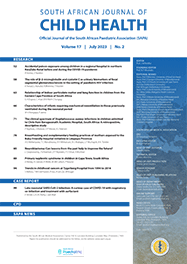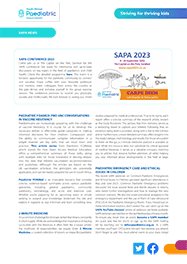Research

Road-to-Health Booklet assessment and completion challenges by nurses in rural primary healthcare facilities in South Africa
Abstract
Background. Appropriate completion of the Road-to-Health Booklet (RTHB) remains crucial as it facilitates the provision of essential packaged health services for the growth and well-being of children under 5 years old.
Objective. To assess the new RTHB completion and its utilisation challenges by nurses in rural primary healthcare (PHC) in the West Rand District, Gauteng Province, South Africa.
Methods. A concurrent mixed-method design was used to conduct a retrospective record review of the 75 RTHBs completed by the nurses in the two PHC facilities. Nine in-depth interviews were also conducted with purposefully selected nurses to explore their RTHB utilisation challenges. Categorical data were analysed descriptively, comparing ‘fully completed’, ‘partially completed’ and ‘not completed’ sections of the RTHB. In-depth interviews were analysed using a thematic analysis approach which involved conducting inductive coding, grouping codes according to their similarity and identifying emerging themes.
Results. The highest completed sections of the RTHB were the weight-for-age growth chart (81%) and mother PMTCT/HIV (78%). The lowest completed section was the oral health examination, with only one booklet completed (7%). Length/height × age (37%) and weight × length/height (33%) charts were partially completed. RTHB utilisation challenges included healthcare provider dilemmas (lack of time, burnout, habitual practices); patient-related dilemmas (language barriers, tampering with RTHB pages, lack of resources); and health system dilemmas (equipment shortages and lack of training for health personnel).
Conclusion. Although the quality of the RTHB is improving, there are still considerable challenges concerning its completion. It is therefore necessary to implement ways to improve its utilisation in this rural district, for effective under-5 child health management. Without substantial improvement, opportunities for enhancing under-5 child health will be missed.
Authors' affiliations
T Win, Community Partners International, Bahan Township, Yangon, Myanmar
M G Mlambo, Department of Institutional Research and Business Intelligence, Risk and Advisory Services, University of South Africa, Pretoria, South Africa; Department of Family Medicine and Primary Care, Faculty of Health Sciences, University of the Witwatersrand, Johannesburg, South Africa
Full Text
Cite this article
Article History
Date published: 2020-10-12
Article Views
Full text views: 990

.jpg)



Comments on this article
*Read our policy for posting comments here